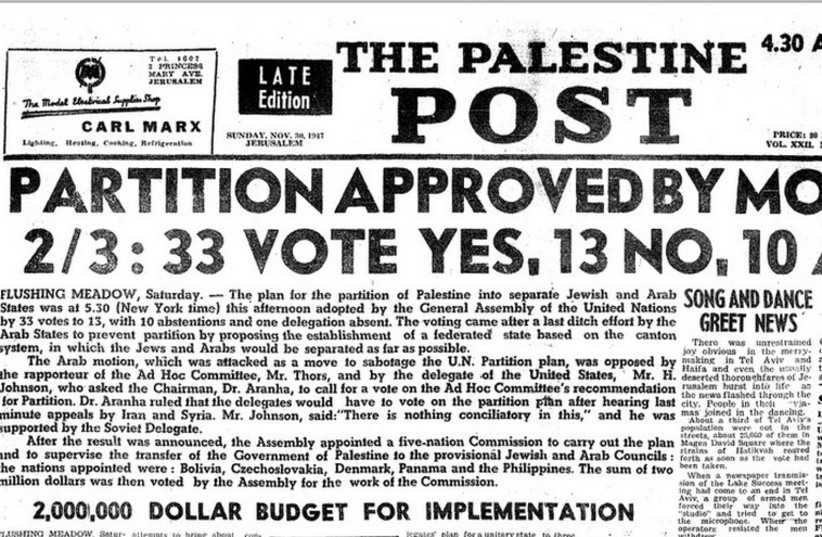This week marks the anniversary of a pivotal moment in history – the approval of the UN Partition Plan on November 29, 1947.
This visionary plan aimed to create two separate states, one Jewish, and one Arab, with an international zone encompassing Jerusalem and Bethlehem. Undoubtedly, the UN’s decision laid the groundwork for peace plans and the future of the region; it also offered a diplomatic framework for Israel’s establishment as an independent state, but it has become a tool for perpetuating conflicts, wielded by some of Israel’s adversaries.

Today, the UN and some member states seem to have deviated from both the spirit and the substance of that decision.
The partition plan faced dissent within the UN General Assembly, with 33 states in favor, 13 against, and 10 abstentions.
Despite the Zionist leadership in Palestine’s acceptance of the plan and demonstration of its commitment to working within its imperfect constraints, the Arab states and the Arab population in Palestine at the time, chose war.
The ensuing conflict forced Israel to fight for its existence between 1947 and 1948, successfully overcoming Egypt, Jordan, Lebanon, Syria, and volunteers from across North Africa and the Middle East.
Paralleling the past
Paralleling those historic struggles, Israel today faces a battle against the genocidal attacks of Hamas. While Israel’s military strength has evolved and grown over time, Hamas poses a unique challenge by using Israeli hostages and Palestinian civilians as human shields, exploiting international sympathy for the Palestinian cause.
Regrettably, international organizations, including various UN bodies and the International Committee of the Red Cross, have fallen short of their responsibilities. Women’s organizations, both within and outside the UN, have neglected to support female victims of Hamas crimes.
Israel has had to exert substantial effort to document, inter alia, the sexual violence perpetrated by Hamas on October 7, while it is the UN that should have played a crucial role in documenting the war crimes of Hamas, as it has in other conflicts. Moreover, renowned human rights groups such as Amnesty International, Human Rights Watch, Save the Children, and others, should have taken the lead in documenting and reporting on the crimes of October 7.
Instead, Israel has had to tirelessly struggle to bring attention to the crimes committed by Hamas on the global stage.
The October 7 massacre by Hamas marked an unprecedented level of violence and mass murder, surpassing even the atrocities committed by other terrorist groups, such as those in the 2008 Mumbai attacks. Despite the severity of the situation, some countries, including Russia and China, have failed to condemn Hamas’s crimes.
Furthermore, the Red Cross has not visited Israelis held in Gaza, leaving elderly hostages without essential medical care for 50 days. The lack of vocal demands from humanitarian groups, including the Red Cross, and the disappointment from other humanitarian organizations, contribute to the impunity enjoyed by Hamas for its crimes. The ability of Hamas leaders to travel freely around the region – from Doha to Beirut to Ankara – illustrates the sense of immunity that this group continues to enjoy.
It is imperative for the UN and human rights organizations to reassess their roles and functions. The ongoing war provides them with a unique opportunity to reinvent themselves, breaking free from past biases and resisting manipulation by authoritarian regimes cynically exploiting the UN to advance their interests and shield themselves from critique.
Responsibility also lies with the Western nations that backed the November 1947 resolution and consider themselves among Israel’s friends today. It is incumbent upon them to ensure that human rights are not sacrificed in appeasing Hamas.
As Hamas pursues regional goals, seeking to undermine the Palestinian Authority and instigate violence, chaos, genocide, and instability in the Middle East, it must be confronted with resolute determination.
The spirit of 1947 must be revived, not only in unwavering support for Israel’s rights, but also in the defense of the rights of free peoples in the region to live without the looming threat of extremism. This requires a global commitment to justice, accountability, and a renewed dedication to the founding principles of the UN.
